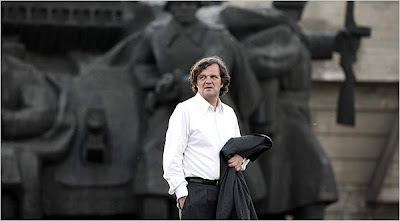
French Connection: K.G.B. Colonel Plotting to Break the Isolation
Based on true, surprisingly little-known events that hastened the downfall of the Soviet Union, Christian Carion’s espionage drama, “Farewell (L’Affaire Farewell),” is a refreshing reminder in the age of the Bourne movies that spies are real people leading everyday lives. (We’ll know more about that when a movie is made about the 10 Russian agents sent home this month by the United States.)
The film’s principal characters are portrayed by two leading European filmmakers: the Serbian director Emir Kusturica (“Underground”) plays the K.G.B. colonel Sergei Grigoriev, and the French director Guillaume Canet (“Tell No One”) is his French connection, Pierre Froment. Sergei is based on the real-life Vladimir Vetrov, whose code name, given to him by the French intelligence service, was “Farewell.” The movie’s staking out of a (sometimes shaky) middle ground between serious comedy and high-tech fantasy is a considerable accomplishment that deglamorizes spying as an occupation by making it look a little silly.
Sergei, disenchanted with Communism under Leonid Brezhnev, is a bulky, bearish middle-aged man with a wife, Natasha (Ingeborga Dapkunaite), and a rebellious teenage son, Igor (Evgenie Kharlanov). The hot-headed Igor, who dismisses Brezhnev as “an old fool,” spends his spare time listening to forbidden Western rock (he is obsessed with Queen) through headphones attached to a cassette recorder while doing his homework. For no obvious reason Sergei reactivates an old romance with Alina (Dina Korzun), a blond K.G.B. translator who becomes besotted with him.
Although Sergei still believes in Communist ideals, Soviet life under Brezhnev is so immobilized by bureaucracy that it is becoming dysfunctional. Daily existence in Moscow is steeped in an atmosphere of paranoia and duplicity tinged with a sense of expectation; things have to change. In passing top-secret documents to Pierre, a nervous, low-level milquetoast who works for a French company in Moscow, Sergei hopes to weaken the Soviet Union and allow a freer life for Igor, who has no knowledge of his father’s traitorous activities.
Because Sergei can’t reveal the truth to the contemptuous Igor (they come to blows in one scene), the father’s loneliness and isolation lend the character a tragic nobility deepened by Mr. Kusturica’s sad, world-weary portrayal.
The only rewards he seeks for handing over priceless information are goodies from Paris: brandy, chocolates, Champagne, and a Walkman (he calls it a Johnny Walkman) and Queen cassettes (he calls the band Keen) for Igor. He is also a devotee of the melancholy French singer-songwriter Léo Ferré and a lover of French poetry. Alfred de Vigny’s “Death of the Wolf” becomes a metaphor for the life and stoic philosophy of a man resigned to being a silent loner.
By STEPHEN HOLDEN
[Source]









0 komentar:
Post a Comment